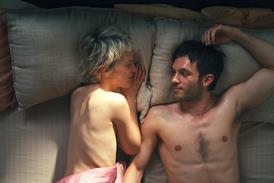Dir: MajidMajidi.
With The Willow Tree, Iranian film-maker MajidMajidi gives in to the mawkish melodramatictendencies he was always managed to keep at arm's length in past works like
As in Colours Of Paradise he uses blindness asan allegory, this time for a grand diatribe against the ungrateful human race -or at least one emblematic specimen - which does not seem to perceive andappreciate the gifts handed to it from heaven.
But his skeletal story of ablind university lecturer who regains his eyesight but derives no happiness isplagued from the start by heavy-handed direction, poor acting and a lack ofnarrative imagination.
All that it can offerinstead are a series of standard poetic images - nature in bloom, rain falling,birds singing and other praiseworthy expressions of creation - which are allwell and good but offer scant substance on which Majidican hang his themes.
With little to offer beyondsuch a bare bones plot, The Willow Treeis unlikely to travel far - even festivals may have second thoughts - despite Majidi's high reputation in arthousecircles.
Youssef (Parvis Parastui) is a 46-year-old introvert Iranian intellectualwhose belief in God is somehow tempered by his personal misfortune: he has beenblind since the age of eight. But his sight is miraculously restored after an operationin
Back in Teheran, doubts andtemptations start to creep in following the initial wave of excitement. Beforehe bemoaned his invalidity; now he blames fate for returning his sight and, inthe process, torture him by displaying the countless delights he missed atvarious stages of his past that he cannot now revisit.
He gazes at his devoted wife(Roya Taymourian), who hehas never seen before, and thinks she is not as pretty as some of the otherwomen around. As a result he tries to court a young student of his but gives upwhen he realises that he doesn't stand a chance. Instead he wanders around Teheran,glaring enviously at all those who never knew what it means to live in darknessfor so many years.
Angry with life, his destinyand himself, he destroys everything around him - including all his writings andevery book in his voluminous braille library - rejectshis wife's compassion and even pushes away his cute little daughter.
Eventually he loses hiseyesight again, refusing his uncle's offer to send him back to
Majidi's lecture, with all its religious undertones, is allmessage and little form: Man should be grateful for every little blessing thatcomes his way, instead of always moaning and asking for more.
In his earlier work Majidi examined ethical problems in the context of thedestitute classes and the urgency of their struggle to make ends meet. Herehowever, his look at the wealthy upper middle class suffers from a lack ofplot.
The weight of the film reston the shoulders of lead Parviz Parastui,who is rarely off-camera, but his interpretation - consisting mainly of heavybreathing, bursting into tears of self-pity, tentative imitations of a blindman's walk and clumsy tantrums - falls short of expectations. Nor can the restof the cast help much, their roles mostly limited to silent reaction shots.
Mahmoud Kalari's camera is themost effective tool, telling whatever story there is through eloquent and remarkablywell framed images.
The sound, uniformly pushedup throughout to signify its importance in the world of the blind, could easilybe brought down a couple of notches for the comfort of the sighted.
Production companies
Majid Majidi FilmProduction
Soureh Cinema Development
International sales
GreeneStreet Films
Executive producers
Majid Majidi
Seyyed Said Seyedzadeh
Producer
Majid Majidi
Screenplay
Majid Majidi
Fouad Nahas
Nasser Hashemzadeh
Cinematography
Mahmoud Kalari
Editor
Hassan Hassandoost
Production design
Behsad Kazzazi
Music
Ahmad Pejman
Parvis Parastui
Roya Taymourian
Afarin Obeisi
Mohammad Amir Maji
Leila Otabi
Melika Eslati



















No comments yet